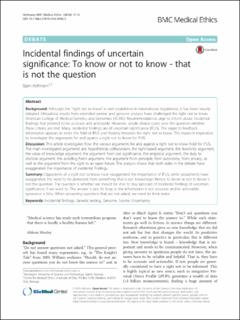| dc.contributor.author | Hofmann, Bjørn | |
| dc.date.accessioned | 2020-04-24T09:30:54Z | |
| dc.date.available | 2020-04-24T09:30:54Z | |
| dc.date.created | 2016-12-25T16:52:35Z | |
| dc.date.issued | 2016 | |
| dc.identifier.citation | BMC Medical Ethics. 2016, 17 (13), 1-9. | en_US |
| dc.identifier.issn | 1472-6939 | |
| dc.identifier.uri | https://hdl.handle.net/11250/2652387 | |
| dc.description.abstract | Background
Although the “right not to know” is well established in international regulations, it has been heavily debated. Ubiquitous results from extended exome and genome analysis have challenged the right not to know. American College of Medical Genetics and Genomics (ACMG) Recommendations urge to inform about incidental findings that pretend to be accurate and actionable. However, ample clinical cases raise the question whether these criteria are met. Many incidental findings are of uncertain significance (IFUS). The eager to feedback information appears to enter the field of IFUS and thereby threaten the right not to know. This makes it imperative to investigate the arguments for and against a right not to know for IFUS.
Discussion
This article investigates how the various arguments for and against a right not to know hold for IFUS. The main investigated arguments are: hypothetical utilitarianism, the right-based argument, the feasibility argument, the value of knowledge argument, the argument from lost significance, the empirical argument, the duty to disclose argument, the avoiding harm argument; the argument from principle, from autonomy, from privacy, as well as the argument from the right to an open future. The analysis shows that both sides in the debate have exaggerated the importance of incidental findings.
Summary
Opponents of a right not to know have exaggerated the importance of IFUS, while proponents have exaggerated the need to be protected from something that is not knowledge. Hence, to know or not to know is not the question. The question is whether we should be able to stay ignorant of incidental findings of uncertain significance, if we want to. The answer is yes: As long as the information is not accurate and/or actionable: ignorance is bliss. When answering questions that are not asked, we need to think twice. | en_US |
| dc.language.iso | eng | en_US |
| dc.publisher | BioMed Central | en_US |
| dc.rights | Navngivelse 4.0 Internasjonal | * |
| dc.rights.uri | http://creativecommons.org/licenses/by/4.0/deed.no | * |
| dc.title | Incidental findings of uncertain significance: To know or not to know--that is not the question | en_US |
| dc.type | Peer reviewed | en_US |
| dc.type | Journal article | en_US |
| dc.description.version | publishedVersion | en_US |
| dc.source.pagenumber | 1-9 | en_US |
| dc.source.volume | 17 | en_US |
| dc.source.journal | BMC Medical Ethics | en_US |
| dc.source.issue | 13 | en_US |
| dc.identifier.doi | 10.1186/s12910-016-0096-2 | |
| dc.identifier.cristin | 1417301 | |
| dc.description.localcode | Open Access This article is distributed under the terms of the Creative Commons Attribution 4.0 International License (http://creativecommons.org/licenses/by/4.0/), which permits unrestricted use, distribution, and reproduction in any medium, provided you give appropriate credit to the original author(s) and the source, provide a link to the Creative Commons license, and indicate if changes were made. The Creative Commons Public Domain Dedication waiver (http://creativecommons.org/publicdomain/zero/1.0/) applies to the data made available in this article, unless otherwise stated. | en_US |
| cristin.ispublished | true | |
| cristin.fulltext | original | |
| cristin.qualitycode | 1 | |

